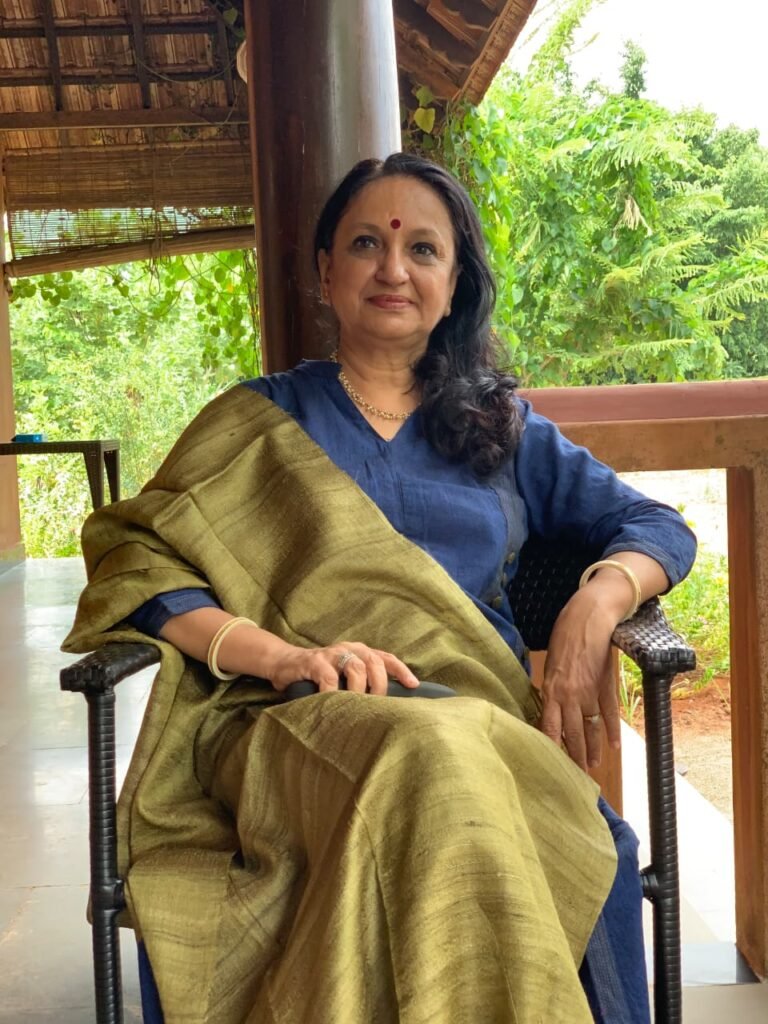Tulsi- The saviour of humanity

Dr Mala Kapadia
Director & Professor
My grandmother has been my inspiration at many levels. I enjoyed watching her and now when I look back, I realize that though she never lectured me on any issues, her behavior has been imprinted on my manas. She would pray near the Tulsi plant in the balcony of our small home in midst of Mumbai city. Before lunch, she would go again to the plant, fold hands, and then pick up 2-3 leaves, wash them well, and place in the plate. Everything else will be served only post Tulsi leaves are placed. Again, she will begin eating by chewing these leaves first, only then take the first morsel. This tradition has remained with me even today.
However, I do not see this being followed in most homes today. We Indians have moved away not only from our traditions, but many are not even aware of the traditions and their importance. My grandmother was not educated in school and college, however, she carried forward the tradition, facilitating the science not to be forgotten. Today when we google the term Tulsi, About 2,79,00,000 results (0.72 seconds) are reported. However, the ground reality is that most Indian homes do not have Tulsi at home or in their plates. We have known enough of the religious stories behind Tulsi, and the medicinal values of Tulsi. Unfortunately, none inspired us enough to integrate Tulsi in our daily life.
The question we need to answer is, If not now, when? Pandemic has taken such toll on humanity and the planet too. Imagine, if the tradition of having Tulsi in each house, and in everyone’s diet had continued, how would this impact the health? Tulsi purifies the air, it vibrates at an energy that creates positive health, it increases immunity, helps in cough, fever, cold, lack of taste and excessive thirst. Kapoor Tulsi, one variety which is not very popular, actually has a fragrance of Kapoor or Camphor. When you eat the leaves or crush them and add in tea, you feel the refreshing coolness of camphor purifying the mouth and nasal passage. Tulsi has been highly advocated for respiratory to cholesterol and heart-related issues. Camphor is FDA approved topical antitussive- anti-cough. Camphor oil is used in many medicines and beauty products, or even home remedies. We need some scientific research on the impact of Kapoor or Camphor Tulsi on our health and environment. However, till that research is done, why not trust our grandparents, ancestors, the land of Rishis, who have known the science of life, and made it magical by creating stories and rituals around them.
Pandemic is Nature’s call for us to wake up and take the baby steps towards health, healing, and happiness. As we run pillar to post for Oxygen, can we not have Tulsi Vana- forest of Tulsi in our homes? We certainly will be able to inhale more purified air and reach out to the plants like a mother at the slightest discomfort of health. If not now, When? If not you, Who? Take the first step. Gift yourself Kapoor Tulsi plant. Second step will certainly follow- gift them to others in your ecosystem. Swastha Vyakti- Swastha Samaaj- Swastha Rashtra.
Dr Mala Kapadia is Director of Centre for Wellbeing and Wellness and Professor, Resident Mentor at Rashtram School of Public Leadership. She is the Founder of Human Potential Consulting named ‘Tame the Monkey’. Mala was an Adjunct Professor with S. P. Jain School of Global Management at Dubai, Singapore, Sydney, and Mumbai campuses from 2005 to March 2020. Ph. D. in Literature, her academic journey is through Psychology, Human Resources, Yoga and Ayurveda, Film & Video Production. Her career has been through research, education, journalism, Human Resources and Consulting. Her area of research is Indic Wisdom for the betterment of humanity.
Education Psychology through Ayurveda and Yoga is an integral research area and one of the focus areas of her current work along with creating Indic frameworks and course curriculums for integration into mainstream courses.
Dr Mala Kapadia has presented and participated in various International Conferences and Journals. She has embraced a sustainable lifestyle for years now and has been passionately involved with the sustainable living initiative by Vaidyagrama Ayurvedic Healing Village, Coimbatore.
